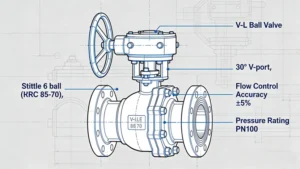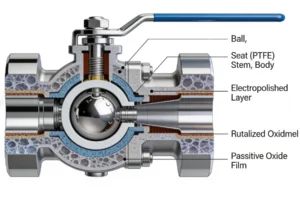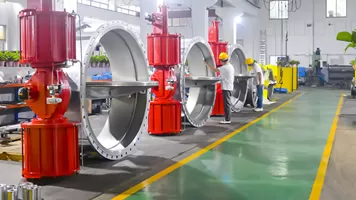In the landscape of EPC (Engineering, Procurement, Construction) infrastructure pipeline projects, where reliability, durability, and compliance stand as non-negotiable pillars, large diameter trunnion mounted ball valves emerge as critical components. These valves serve as the “control core” of fluid transportation systems, governing the flow of oil, gas, water, and other industrial media with precision while withstanding extreme operating conditions. As a professional manufacturer specializing in industrial ball valves and butterfly valves, TIANYU has dedicated years of expertise to the research, development, and production of large diameter trunnion mounted ball valves tailored for EPC infrastructure pipeline construction. This article delves into the essential attributes, manufacturing processes, product advantages, and application scenarios of TIANYU’s large diameter trunnion mounted ball valves, providing EPC contractors, project engineers, and procurement professionals with a comprehensive guide to understanding and selecting high-performance valve solutions.
I. The Strategic Significance of Large Diameter Trunnion Mounted Ball Valves in EPC Infrastructure Pipelines
EPC infrastructure pipeline projects—spanning oil and gas transmission, municipal water supply, industrial fluid transportation, and power generation systems—demand valves that can adapt to complex working environments, meet strict international standards, and integrate seamlessly into long-term project operations. Large diameter trunnion mounted ball valves, distinguished by their structural design and operational characteristics, play an irreplaceable role in these scenarios, and their strategic value is reflected in multiple dimensions.
A. Ensuring the Stability of Large-Scale Fluid Transportation
In EPC pipeline projects, especially those with diameters exceeding DN300, the volume and pressure of fluid transportation are significantly higher than in conventional systems. Trunnion mounted ball valves, with their unique trunnion support structure, fix the ball at both the top and bottom, preventing the ball from shifting under high pressure and large flow conditions. This structural advantage ensures that the valve maintains stable sealing performance even when handling media with high velocity and pressure fluctuations, avoiding leakage risks that could lead to project delays, environmental pollution, or safety accidents.
B. Adapting to the Diverse Operating Conditions of EPC Projects
EPC infrastructure pipelines are often distributed across diverse geographical and climatic environments—from the high-temperature deserts of the Middle East to the low-temperature permafrost of Northern Europe, and from the corrosive marine atmosphere of offshore platforms to the chemical-rich industrial zones. Large diameter trunnion mounted ball valves from TIANYU are engineered to withstand these harsh conditions, with customizable material selections, sealing systems, and structural designs that adapt to temperature ranges from -196℃ to 450℃, pressure ratings from PN10 to PN40, and corrosive media such as crude oil, natural gas, seawater, and chemical solvents.
C. Meeting the Strict Compliance Requirements of EPC Projects
EPC projects, particularly those involving international cooperation, are subject to rigorous regulatory and certification standards, including API, ISO, ANSI, and CE. Large diameter trunnion mounted ball valves, as key components, must comply with these standards to ensure project qualification and operational safety. TIANYU’s products undergo strict testing and certification processes, adhering to API 6D (for pipeline ball valves), API 607 (fire-safe design), ISO 9001 (quality management), and other international standards, providing EPC clients with reliable documentation and compliance guarantees for project acceptance.

II. Key Attributes and Specification Parameters of TIANYU Large Diameter Trunnion Mounted Ball Valves
The performance of large diameter trunnion mounted ball valves is determined by a series of core attributes and specification parameters, which directly affect their applicability, reliability, and service life in EPC infrastructure pipeline projects. TIANYU, based on years of market experience and technical accumulation, has optimized these parameters to align with the actual needs of EPC projects, ensuring that each product meets the highest industry standards.
A. Size and Pressure Range: Matching Large-Scale EPC Pipeline Requirements
The “large diameter” attribute of these valves is defined by the specific needs of EPC infrastructure pipelines, where transportation efficiency and system scale require valves to accommodate large flow rates. TIANYU’s large diameter trunnion mounted ball valves cover a wide size range, with nominal diameters (DN) from DN300 (12 inches) to DN2000 (80 inches), fully meeting the requirements of large-scale pipeline projects such as cross-regional oil and gas pipelines, municipal water supply networks, and industrial process pipelines.
In terms of pressure rating, the valves are designed to handle the high-pressure operating conditions common in EPC projects. The pressure classes include PN10, PN16, PN25, PN40, and ANSI Class 150, 300, 600, enabling them to adapt to different pipeline pressure systems—from low-pressure municipal water pipelines to high-pressure oil and gas transmission lines. This wide pressure range ensures that TIANYU’s valves can be integrated into various EPC project designs without the need for extensive modifications.
B. Material System: Balancing Corrosion Resistance and Mechanical Strength
The material selection of large diameter trunnion mounted ball valves is a critical factor in ensuring their service life and reliability in EPC projects, as it directly impacts the valve’s resistance to corrosion, wear, and extreme temperatures. TIANYU adopts a tiered material system, selecting high-quality materials for each component based on the specific operating conditions of the EPC project.
1. Valve Body and Bonnet
The valve body and bonnet, as the primary pressure-bearing components, are manufactured using materials with excellent mechanical properties. Common materials include carbon steel (A105, WCB), stainless steel (304, 316, 316L), duplex stainless steel (2205, 2507), and special alloys such as Monel and Hastelloy. Carbon steel is suitable for general industrial and municipal pipelines with non-corrosive media; stainless steel and duplex stainless steel are ideal for corrosive environments such as seawater desalination and chemical transportation; and special alloys are used in extreme conditions such as high-concentration acid-base media or high-temperature oil and gas pipelines.
2. Ball and Seat
The ball and seat are the core sealing components, and their material matching directly affects the valve’s sealing performance and service life. The ball is typically made of stainless steel (316, 316L) or hardened stainless steel (with a surface hardness of HRC60 or higher) to enhance wear resistance. The seat material is selected based on the medium and operating temperature: for general media, polytetrafluoroethylene (PTFE) and its derivatives are used for their excellent chemical stability and low friction coefficient; for high-temperature or fire-safe requirements, metal seats (such as Inconel, Stellite) are adopted to ensure sealing integrity even in extreme conditions.
3. Trunnion and Stem
The trunnion and stem, which bear the load of the ball and transmit the operating torque, are made of high-strength stainless steel or alloy steel, with surface treatments such as nitriding or chrome plating to improve wear resistance and corrosion resistance. This ensures that the valve can withstand repeated opening and closing operations without structural failure, meeting the long-term operational needs of EPC projects.
C. Sealing Performance: Achieving Zero Leakage for EPC Safety Requirements
Leakage is a major risk in EPC infrastructure pipeline projects, as it can lead to media loss, environmental pollution, and even safety hazards. TIANYU’s large diameter trunnion mounted ball valves adopt a multi-level sealing design to achieve strict leakage control standards.
1. Primary Sealing: Ball-Seat Interface
The primary sealing between the ball and seat is achieved through a preloaded sealing structure. The seat is pressed against the ball under the action of a spring or medium pressure, forming a tight seal. For metal-seated valves, the sealing surface is precision ground to ensure a high degree of flatness and matching, achieving ANSI Class VI leakage standards (near-zero leakage). For soft-seated valves, the elastic deformation of the PTFE material ensures effective sealing even under low pressure conditions.
2. Secondary Sealing: Stem and Bonnet
The stem and bonnet interface adopts a multi-layer packing seal or bellows seal design. The packing seal uses a combination of PTFE, graphite, and other materials, with a lantern ring for lubrication and cooling, preventing media leakage along the stem. The bellows seal, suitable for toxic, flammable, or expensive media, uses a metal bellows to isolate the stem from the medium, achieving absolute zero leakage and meeting the strict environmental protection requirements of EPC projects.
3. Fire-Safe Sealing
In EPC projects such as oil and gas pipelines, fire safety is a key consideration. TIANYU’s large diameter trunnion mounted ball valves are designed with fire-safe features in accordance with API 607 and API 6FA standards. In the event of a fire, the soft seat material will burn away, and the metal backup seat and ball will form a metal-to-metal seal, preventing large-scale media leakage and controlling the spread of the fire. This design provides an additional layer of safety for EPC projects in high-risk environments.
D. Operation Mechanism: Adapting to EPC Automation and Remote Control Needs
EPC infrastructure pipeline projects often span large areas, with valves installed in remote or harsh environments, making manual operation impractical. TIANYU’s large diameter trunnion mounted ball valves are equipped with a variety of operation mechanisms to meet the automation and remote control requirements of EPC projects.
1. Actuator Types
The valves can be matched with electric, hydraulic, or pneumatic actuators. Electric actuators are suitable for projects requiring precise control and remote operation, with features such as position feedback, fault diagnosis, and manual override, enabling integration into the EPC project’s central control system. Hydraulic actuators are ideal for high-torque applications (such as large diameter valves above DN1000), providing stable and powerful operation even in low-temperature environments. Pneumatic actuators are widely used in industrial pipelines due to their fast response, simple maintenance, and explosion-proof performance.
2. Control Features
The actuators are equipped with various control modules, including on-off control, proportional control, and emergency shut-off functions. On-off control is used for basic opening and closing operations; proportional control enables precise adjustment of flow rates, suitable for process control in industrial EPC projects; emergency shut-off functions can quickly close the valve in the event of pipeline overpressure, leakage, or other emergencies, protecting the safety of the entire system.
III. Core Features of TIANYU Large Diameter Trunnion Mounted Ball Valves: Tailored for EPC Infrastructure Pipelines
Beyond the basic parameters, TIANYU’s large diameter trunnion mounted ball valves incorporate a range of core features designed to address the specific challenges of EPC infrastructure pipeline construction. These features reflect TIANYU’s deep understanding of EPC project requirements and its commitment to providing practical, reliable valve solutions.
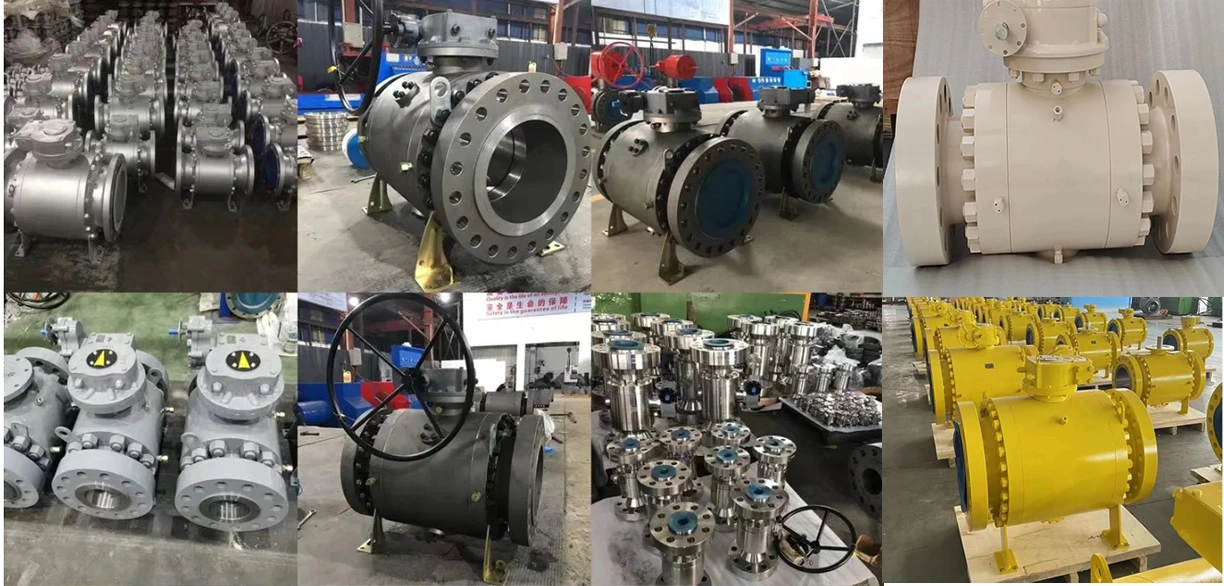
A. Robust Trunnion Structure for High-Pressure Stability
The trunnion mounted design is the defining feature of these valves, and TIANYU has optimized this structure to enhance its performance in high-pressure EPC pipeline projects. Unlike floating ball valves, where the ball is supported only by the seat, trunnion mounted valves use upper and lower trunnions to fix the ball, transferring the pressure load of the medium to the trunnions and valve body rather than the seat. This design eliminates the risk of seat damage caused by excessive pressure, ensuring that the valve maintains stable operation even under high-pressure conditions (up to PN40 or ANSI Class 600).
Additionally, the trunnion structure reduces the operating torque of the valve, making it easier to operate even for Large Diameter Valves Manufacturer. This is particularly important for EPC projects, as it reduces the size and cost of the actuator while improving the reliability of the valve’s opening and closing operations.
B. Wear-Resistant and Corrosion-Resistant Surface Treatments
In EPC pipeline projects involving abrasive media (such as crude oil with sand particles) or corrosive media (such as seawater or chemical solvents), the surface of the valve components is prone to wear and corrosion, reducing the valve’s service life. TIANYU addresses this issue through advanced surface treatment technologies applied to key components such as the ball, seat, and trunnion.
Common surface treatments include hard chrome plating, ceramic coating, and thermal spray welding. Hard chrome plating forms a dense chromium layer on the surface of the component, improving wear resistance and corrosion resistance. Ceramic coating, with its extremely high hardness and chemical stability, is suitable for highly abrasive media. Thermal spray welding uses materials such as Stellite to form a wear-resistant alloy layer on the sealing surface, extending the service life of the valve to 10 years or more in harsh conditions—significantly reducing maintenance costs and downtime for EPC projects.
C. Modular Design for Easy Installation and Maintenance
EPC infrastructure pipeline projects often have tight construction schedules, and the installation and maintenance efficiency of valves directly affects the overall project progress. TIANYU’s large diameter trunnion mounted ball valves adopt a modular design, simplifying these processes and reducing labor and time costs.
The modular design allows for the separate assembly and disassembly of components such as the actuator, bonnet, and seat. During installation, the valve can be pre-assembled in the factory and then quickly installed on the pipeline, reducing on-site construction time. During maintenance, damaged components can be replaced individually without removing the entire valve from the pipeline—an important advantage for EPC projects where pipeline shutdowns are costly and disruptive.
Additionally, the valve’s internal structure is designed for easy access, with standardized components that are readily available, ensuring minimal maintenance downtime and supporting the continuous operation of EPC pipeline systems.
D. Wide Temperature Adaptability for Diverse Climatic Conditions
EPC infrastructure pipelines are often deployed across regions with extreme climatic conditions, from the hot deserts of the Middle East (where ambient temperatures can exceed 50℃) to the cold regions of Northern Europe and Canada (where temperatures can drop to -40℃ or lower). TIANYU’s large diameter trunnion mounted ball valves are engineered to adapt to these wide temperature ranges, ensuring reliable performance regardless of the environment.
For high-temperature applications (such as power plant steam pipelines), the valves use high-temperature resistant materials (such as WCB with high-temperature heat treatment) and metal seats, preventing material deformation or softening at temperatures up to 450℃. For low-temperature applications (such as LNG transportation pipelines), the valves are manufactured with low-temperature resistant materials (such as A350 LF2) and undergo cryogenic treatment to ensure toughness and sealing performance at temperatures as low as -196℃. This wide temperature adaptability makes TIANYU’s valves suitable for EPC projects worldwide, regardless of the local climate.
IV. Manufacturing Processes: The Core Guarantee of EPC-Grade Quality
The quality of large diameter trunnion mounted ball valves directly determines the safety and reliability of EPC infrastructure pipeline projects. TIANYU adheres to strict manufacturing processes and quality control standards, integrating advanced equipment and technical expertise to ensure that each valve meets EPC-grade requirements. From raw material procurement to final product testing, every step is subject to rigorous supervision and inspection.

A. Precision Forging and Casting of Key Components
The valve body, ball, and trunnion—key components of large diameter trunnion mounted ball valves—undergo precision forging or casting processes to ensure their mechanical properties and structural integrity.
1. Forging Process
For high-pressure and critical applications (such as oil and gas pipelines), TIANYU uses a forging process for the valve body and ball. Forging involves heating the raw material to a high temperature and then applying pressure to shape it, which refines the metal grain structure, improves density, and enhances mechanical properties such as tensile strength and impact resistance. The forging process eliminates internal defects such as porosity and cracks, ensuring that the components can withstand high pressure and fatigue loads over long-term operation.
After forging, the components undergo precision machining using CNC (Computer Numerical Control) lathes and milling machines to ensure dimensional accuracy. The ball’s sealing surface, for example, is machined to a tolerance of ±0.01mm, ensuring a perfect match with the seat and achieving reliable sealing.
2. Casting Process
For large diameter valves (above DN1000) or non-critical applications, TIANYU uses a precision casting process (such as sand casting or investment casting). Sand casting is suitable for large-scale components, while investment casting is used for parts with complex shapes and high precision requirements. The casting process is strictly controlled, with raw material composition testing, mold design optimization, and pouring temperature control to ensure that the castings have uniform structure and no internal defects.
After casting, the components undergo heat treatment (such as annealing, quenching, and tempering) to adjust their mechanical properties, reducing internal stress and improving toughness and wear resistance.
B. Advanced Welding Technology for Pressure-Bearing Integrity
Welding is a critical process in the manufacturing of large diameter trunnion mounted Ball Valves, especially for the connection between the valve body and bonnet, and the welding of trunnions to the ball. TIANYU adopts advanced welding technologies and strict welding quality control to ensure the pressure-bearing integrity of the welded joints.
1. Welding Methods
Common welding methods include TIG (Tungsten Inert Gas) welding, MIG (Metal Inert Gas) welding, and submerged arc welding. TIG welding is used for thin-walled components and precision welding, providing high-quality welds with minimal defects. MIG welding is suitable for medium-thickness components, offering high welding efficiency and stable performance. Submerged arc welding is used for large-diameter, thick-walled valve bodies, ensuring deep weld penetration and high joint strength.
2. Welding Quality Control
TIANYU’s welding process follows strict procedures, including pre-weld cleaning, groove design, welding parameter setting, and post-weld heat treatment. Welders are certified in accordance with ASME IX standards, ensuring their proficiency in handling different welding materials and processes. After welding, each weld undergoes non-destructive testing (NDT), including ultrasonic testing (UT), radiographic testing (RT), magnetic particle testing (MT), and liquid penetrant testing (PT), to detect internal and surface defects such as cracks, pores, and incomplete fusion. Only welds that pass all NDT tests are accepted, ensuring the pressure-bearing integrity of the valve.
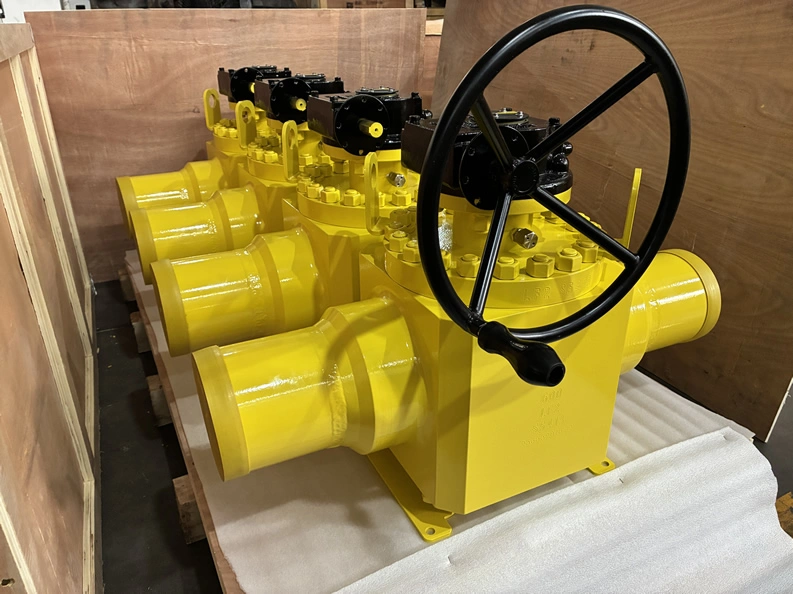
C. Strict Quality Inspection and Testing Procedures
Quality inspection is integrated into every stage of the manufacturing process for TIANYU’s large diameter trunnion mounted ball valves, from raw material incoming inspection to final product testing. This multi-stage inspection ensures that the valves meet the technical requirements of EPC projects and international standards.
1. Raw Material Inspection
All raw materials (such as steel plates, forgings, and castings) are inspected upon arrival, including material composition analysis (using a spectrometer), mechanical property testing (tensile strength, yield strength, impact toughness), and dimensional inspection. Only materials that meet the required standards are accepted for production.
2. In-Process Inspection
During the manufacturing process, each component undergoes multiple in-process inspections to ensure dimensional accuracy and structural integrity. For example, the ball’s diameter, roundness, and sealing surface flatness are measured using coordinate measuring machines (CMMs) with high precision. The valve body’s pressure-bearing cavity is inspected for surface roughness and dimensional tolerance to ensure it meets the design requirements.
3. Final Product Testing
The final product testing of large diameter trunnion mounted ball valves includes a series of rigorous tests to verify their performance, sealing, and reliability:
-
Pressure Testing: Includes shell pressure test and seat pressure test. The shell pressure test is conducted at 1.5 times the nominal pressure to verify the valve body’s pressure-bearing capacity. The seat pressure test is conducted at 1.1 times the nominal pressure to check the sealing performance of the ball-seat interface and stem packing.
-
Leakage Testing: Conducted in accordance with ANSI/FCI 70-2 standards, using helium or nitrogen as the test medium for high-precision leakage detection. For metal-seated valves, the leakage rate must be less than 0.1 cm³/min per inch of valve diameter; for soft-seated valves, zero leakage is required.
-
Operational Testing: The valve is operated through multiple opening and closing cycles (typically 100-500 cycles) to verify the flexibility and reliability of the operation mechanism. The torque is measured during the test to ensure it matches the actuator’s output torque.
-
Special Tests: For EPC projects with special requirements, additional tests are conducted, such as fire-safe testing (per API 607), cryogenic testing (for low-temperature applications), and fatigue testing (to verify service life).
D. Traceability System for Full-Lifecycle Management
EPC infrastructure pipeline projects require full traceability of key components to ensure accountability and facilitate maintenance and replacement. TIANYU has established a comprehensive traceability system that tracks each valve from raw material procurement to delivery.
Each valve is assigned a unique serial number, which is linked to all relevant information, including raw material batch numbers, manufacturing dates, welding records, inspection reports, and certification documents. This information is stored in a digital system, accessible to EPC clients upon request. In the event of a quality issue or maintenance need, clients can quickly trace the valve’s history and obtain the necessary technical support, ensuring the smooth operation of the EPC project.
V. Product Advantages: TIANYU’s Competitive Value in EPC Projects
In the highly competitive market of industrial valves, TIANYU’s large diameter trunnion mounted ball valves stand out due to their unique advantages, which provide tangible value to EPC contractors and project owners. These advantages are rooted in TIANYU’s focus on technology, quality, and customer needs, and they directly address the key concerns of EPC infrastructure pipeline projects—such as cost control, schedule assurance, and long-term reliability.
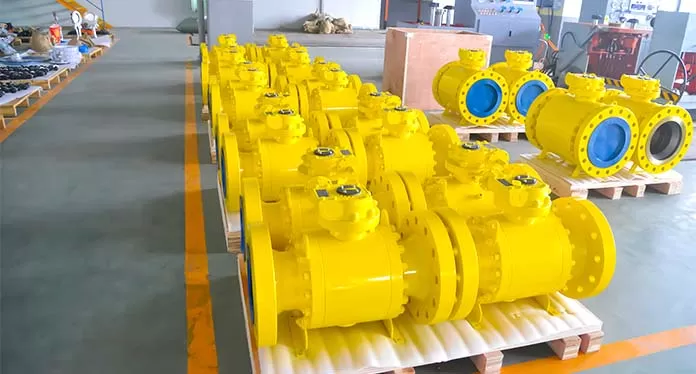
A. Compliance with International Standards: Removing Barriers to EPC Project Acceptance
EPC projects, especially those with international investment or cross-border cooperation, require valves to comply with a range of international standards and certifications. TIANYU’s large diameter trunnion mounted ball valves have obtained numerous international certifications, including API 6D, API 607, API 6FA, ISO 9001, ISO 14001, ISO 45001, CE, and SIL 3. These certifications demonstrate the valves’ compliance with global quality, safety, and environmental standards, ensuring that they meet the requirements of EPC project specifications and facilitating smooth project acceptance.
For example, the API 6D certification ensures that the valves are suitable for pipeline applications, with strict requirements for design, manufacturing, testing, and documentation. The CE certification allows the valves to be sold and used in the European Union market, removing trade barriers for EPC projects in Europe. By choosing TIANYU’s certified valves, EPC clients can avoid the risk of non-compliance, reducing project delays and additional costs.
B. Long Service Life and Low Maintenance Costs: Reducing Total Cost of Ownership
EPC infrastructure pipeline projects are long-term investments, and the total cost of ownership (TCO) of valves—including purchase costs, installation costs, maintenance costs, and replacement costs— is a key consideration for project owners. TIANYU’s large diameter trunnion mounted ball valves are designed for long service life and low maintenance, effectively reducing TCO.
The use of high-quality materials, advanced surface treatments, and robust structural designs ensures that the valves can operate reliably for 10-20 years in normal conditions, significantly longer than the industry average. The wear-resistant and corrosion-resistant features reduce the frequency of maintenance, while the modular design simplifies maintenance procedures and reduces labor costs. Additionally, TIANYU’s valves have a low failure rate, minimizing the cost of unplanned shutdowns and repairs—critical for EPC projects where downtime can result in significant financial losses.
C. Flexible Customization Capabilities: Adapting to Unique EPC Project Requirements
While this article focuses on non-customized core content, it is worth noting that EPC projects often have unique requirements based on specific pipeline designs, operating conditions, and regional standards. TIANYU’s strong R&D and manufacturing capabilities enable it to provide flexible solutions that adapt to these unique needs—without compromising on quality or delivery time.
For example, if an EPC project requires a valve with a special connection type (such as butt welding for buried pipelines) or a custom actuator interface (to integrate with the project’s control system), TIANYU can adjust the design and manufacturing process to meet these requirements. This flexibility ensures that the valves seamlessly integrate into the EPC project’s overall design, avoiding the need for costly modifications or replacements.
D. Reliable Delivery and Global Service Support: Ensuring EPC Project Schedules
EPC projects have strict construction schedules, and delays in the delivery of key components such as valves can have a cascading effect on the entire project. TIANYU has established a mature supply chain management system and production scheduling process to ensure reliable delivery of large diameter trunnion mounted ball valves.
The company’s production facilities include multiple CNC machining centers, forging lines, and assembly workshops, with a monthly production capacity of over 500 large diameter valves. This capacity allows TIANYU to handle large orders from EPC projects, with typical lead times of 4-8 weeks for standard products and 8-12 weeks for special applications. Additionally, TIANYU works with global logistics partners to provide flexible shipping options (sea, air, land) and ensure on-time delivery to project sites worldwide.
Beyond delivery, TIANYU provides comprehensive global service support, including on-site installation guidance, commissioning, maintenance training, and after-sales service. The company has a team of professional service engineers with extensive experience in EPC projects, available to provide technical support 24/7. This global service network ensures that EPC clients receive timely assistance, regardless of their location, further safeguarding project schedules and operational reliability.
VI. Application Scenarios: Adapting to Global EPC Infrastructure Pipeline Projects
TIANYU’s large diameter trunnion mounted ball valves have been widely used in various EPC infrastructure pipeline projects around the world, thanks to their reliable performance, compliance with international standards, and adaptability to diverse operating conditions. The following are the key application scenarios where these valves excel, demonstrating their versatility and value in different industries.

A. Oil and Gas Transmission Pipelines
Oil and gas transmission pipelines are among the most demanding EPC projects, requiring valves to withstand high pressure, corrosive media, and extreme temperatures. TIANYU’s large diameter trunnion mounted ball valves are widely used in onshore and offshore oil and gas pipelines, including crude oil transmission, natural gas transportation, and LNG terminals.
In these applications, the valves are designed with API 6D certification, fire-safe features (API 607/6FA), and corrosion-resistant materials (such as duplex stainless steel and Inconel) to handle the harsh conditions of oil and gas transportation. The trunnion structure ensures stable operation under high pressure (up to ANSI Class 600), while the metal seats and hard surface treatments provide wear resistance against sand and other abrasive particles in crude oil. Additionally, the valves’ emergency shut-off function helps prevent major accidents in the event of pipeline leaks or overpressure.
TIANYU’s valves have been used in major oil and gas EPC projects in the Middle East, Central Asia, and Africa, contributing to the safe and efficient transportation of oil and gas resources.
B. Municipal Water Supply and Wastewater Treatment
Municipal water supply and wastewater treatment EPC projects require valves that are durable, corrosion-resistant, and easy to maintain, as they are critical to ensuring the health and safety of urban residents. TIANYU’s large diameter trunnion mounted ball valves are ideal for these applications, with material selections and structural designs tailored to water and wastewater media.
For municipal water supply pipelines, the valves are made of ductile iron or stainless steel, with EPDM or PTFE seats to ensure non-toxicity and compliance with drinking water standards (such as NSF 61). The large diameter design (up to DN2000) accommodates the high flow rates required for urban water supply, while the modular structure simplifies maintenance and reduces downtime. For wastewater treatment pipelines, the valves are equipped with corrosion-resistant materials (such as 316L stainless steel) and rubber-lined seats to handle the corrosive components in wastewater, preventing blockages and ensuring smooth operation.
TIANYU’s valves have been deployed in municipal EPC projects in Southeast Asia, South America, and Europe, supporting the construction of urban water infrastructure and improving water supply and treatment efficiency.
C. Power Generation Systems
Power generation EPC projects, including thermal power plants, hydropower plants, and nuclear power plants, require valves that can handle high-temperature, high-pressure steam and cooling water. TIANYU’s large diameter trunnion mounted ball valves are used in various parts of power generation systems, such as boiler feedwater pipelines, steam pipelines, and cooling water circulation systems.
In thermal power plants, the valves are designed for high-temperature applications (up to 450℃), with metal seats and heat-resistant materials (such as WCB with high-temperature heat treatment) to withstand the high pressure and temperature of steam. The precise control capabilities of the electric actuators enable accurate adjustment of flow rates, optimizing the efficiency of the power generation process. In hydropower plants, the valves are used in water intake and discharge pipelines, with large diameters (up to DN1600) to handle the high flow rates of water, and corrosion-resistant materials to adapt to the aquatic environment.
TIANYU’s valves have been used in power generation EPC projects in China, Southeast Asia, and the Middle East, contributing to the stable and efficient operation of power plants.
D. Chemical and Petrochemical Industry
Chemical and petrochemical EPC projects involve the transportation of highly corrosive, toxic, and flammable media, requiring valves with strict sealing performance and chemical resistance. TIANYU’s large diameter trunnion mounted ball valves are widely used in chemical pipelines, including the transportation of acids, alkalis, solvents, and petrochemical products.
In these applications, the valves are made of special corrosion-resistant materials such as Hastelloy, Monel, and PTFE-lined steel, ensuring compatibility with a wide range of chemical media. The multi-level sealing design (ball-seat interface and stem packing) achieves zero leakage, preventing the release of toxic or flammable media and ensuring workplace safety. Additionally, the valves’ explosion-proof actuators (ATEX or IECEx certified) are suitable for hazardous areas in chemical plants, reducing the risk of fire and explosion.
TIANYU’s valves have been used in chemical and petrochemical EPC projects in Europe, Asia, and North America, supporting the safe and efficient operation of chemical production processes.
VII. TIANYU: A Reliable Partner for EPC Infrastructure Pipeline Projects
As a professional manufacturer of large diameter Trunnion Mounted Ball Valves, TIANYU combines advanced technology, strict quality control, and comprehensive service support to provide EPC clients with reliable valve solutions. The company’s commitment to innovation and customer satisfaction has made it a trusted partner in EPC infrastructure pipeline projects around the world.
TIANYU’s advantages lie not only in the performance and quality of its products but also in its deep understanding of EPC project requirements. By focusing on compliance, reliability, and cost-effectiveness, TIANYU’s large diameter trunnion mounted ball valves help EPC contractors reduce project risks, ensure construction schedules, and achieve long-term operational efficiency.
Whether it is an oil and gas pipeline in the Middle East, a municipal water supply network in Europe, or a power plant in Southeast Asia, TIANYU’s valves are designed to meet the unique challenges of each project, providing the “control core” that EPC infrastructure pipelines rely on. For EPC clients seeking high-performance, reliable large diameter trunnion mounted ball valves, TIANYU stands ready to be a long-term, trusted partner.
To learn more about TIANYU’s large diameter trunnion mounted ball valves and how they can support your EPC infrastructure pipeline project, visit our official website at tianyuvalves.com or contact our professional sales team for personalized technical consultation and quotation.


